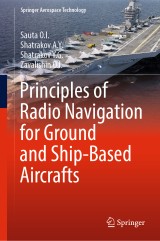Details

Principles of Radio Navigation for Ground and Ship-Based Aircrafts
Springer Aerospace Technology
|
90,94 € |
|
| Verlag: | Springer |
| Format: | |
| Veröffentl.: | 25.05.2019 |
| ISBN/EAN: | 9789811382932 |
| Sprache: | englisch |
Dieses eBook enthält ein Wasserzeichen.
Beschreibungen
This book systematically presents the operating principles and technical characteristics of the main radio navigating systems (RNSs) that make it possible to adequately evaluate the corresponding scratch indexes and levels of air safety for air vehicles, the chief concern of the International Civil Aviation Organization (ICAO). The book discusses how RNS systems substantially determine navigation accuracy and reliability, and therefore air safety; in addition, it presents practical solutions to problems arising in the operation and development of RNS systems.<br>
Basic principles of radio navigation.- The concept of radio navigation systems.- Short-range navigation systems.- Systems of long-range radio navigation with ground-based stations.- Instrumental landing systems.- Satellite radionavigation systems differential and relative operation modes of systems.- Augmentation systems to ground-based GNSs.<p></p>
<p>Dr. Sauta O.I. is an expert on air radio engineering systems for navigation and landing, and holds 20 patents for inventions in the field of radio engineering systems for satellite navigation.<br></p>
<p>Prof. Shatrakov A.Y. is the chair of radio engineering systems at the Institute of Radio Engineering, St. Petersburg State University. His chief research interests are in the area of radio navigation systems for air traffic control and safety. </p><p>Shatrakov Y.G., Professor, Doctor of Technical Sciences, Honored Science Worker of Russia, RATS full member, graduated from Leningrad Institute of Aviation Instrumentation and Leningrad University (Physics and Mathematics Faculty). He defended his thesis in 1966. He published more 400 monographs and textbooks on radio navigation, radiolocation, production organization. He prepared more than 100 candidates and doctors of science as a scientific adviser and scientific consultant. Scientific directions founded under the guidance of Y.G. Shatrakov are as follows: relative radio navigation; increased noise immunity of angle measuring systems due to suppression of correlation errors and interference; secondary radiolocation by individual numbers; reduction of labor intensity in the production of radio electronic products due to the introduction of flexible automated productions. He is the author including 30 patents for inventions in the field of radio technical systems; scientific supervisor of international projects for the creation of the MLS with Thomson-CSF (1980–1988), with US enterprises for the creation of joint LRNSs (long-range radio technical navigation systems) (Tropic-Loran) (1984), chief designer of on-board antenna-feed systems; founder of the correlation interference theory in aviation radio technical complexes and systems.</p><p>Zavalishin O.I. is an expert on the development and production of aeronautical equipment, land and aircraft equipment, land systems as a functional addition to global satellite navigational systems, local differential systems, and landing radio-radar equipment for civil aviation. He is also a member of the council of chief designers, developers and producers of navigational hardware (NAP) for the GNSS.<br></p>
<p>Prof. Shatrakov A.Y. is the chair of radio engineering systems at the Institute of Radio Engineering, St. Petersburg State University. His chief research interests are in the area of radio navigation systems for air traffic control and safety. </p><p>Shatrakov Y.G., Professor, Doctor of Technical Sciences, Honored Science Worker of Russia, RATS full member, graduated from Leningrad Institute of Aviation Instrumentation and Leningrad University (Physics and Mathematics Faculty). He defended his thesis in 1966. He published more 400 monographs and textbooks on radio navigation, radiolocation, production organization. He prepared more than 100 candidates and doctors of science as a scientific adviser and scientific consultant. Scientific directions founded under the guidance of Y.G. Shatrakov are as follows: relative radio navigation; increased noise immunity of angle measuring systems due to suppression of correlation errors and interference; secondary radiolocation by individual numbers; reduction of labor intensity in the production of radio electronic products due to the introduction of flexible automated productions. He is the author including 30 patents for inventions in the field of radio technical systems; scientific supervisor of international projects for the creation of the MLS with Thomson-CSF (1980–1988), with US enterprises for the creation of joint LRNSs (long-range radio technical navigation systems) (Tropic-Loran) (1984), chief designer of on-board antenna-feed systems; founder of the correlation interference theory in aviation radio technical complexes and systems.</p><p>Zavalishin O.I. is an expert on the development and production of aeronautical equipment, land and aircraft equipment, land systems as a functional addition to global satellite navigational systems, local differential systems, and landing radio-radar equipment for civil aviation. He is also a member of the council of chief designers, developers and producers of navigational hardware (NAP) for the GNSS.<br></p>
This book systematically presents the operating principles and technical characteristics of the main radio navigating systems (RNSs) that make it possible to adequately evaluate the corresponding scratch indexes and levels of air safety for air vehicles, the chief concern of the International Civil Aviation Organization (ICAO). The book discusses how RNS systems substantially determine navigation accuracy and reliability, and therefore air safety; in addition, it presents practical solutions to problems arising in the operation and development of RNS systems.
Highlights the basic principles of the construction and operation of radio navigating systems? (RNSs) Presents practical solutions to problems arising in the operation and development of RNS systems Discusses how RNSs substantially determine navigation accuracy and reliability, and in turn air safety
Diese Produkte könnten Sie auch interessieren:

High-Frequency Oscillator Design for Integrated Transceivers

von: J. van der Tang, Dieter Kasperkovitz, Arthur H.M. van Roermund

149,79 €















